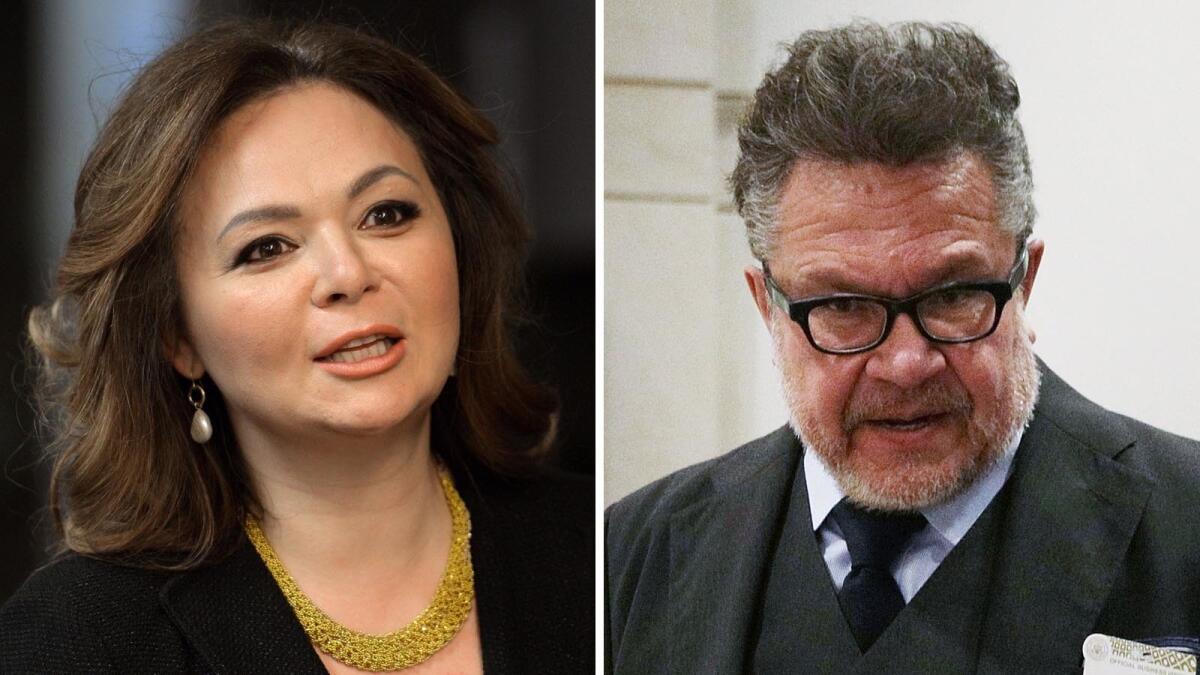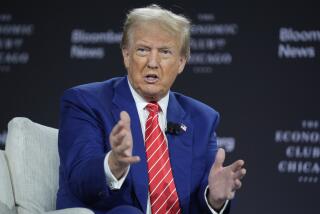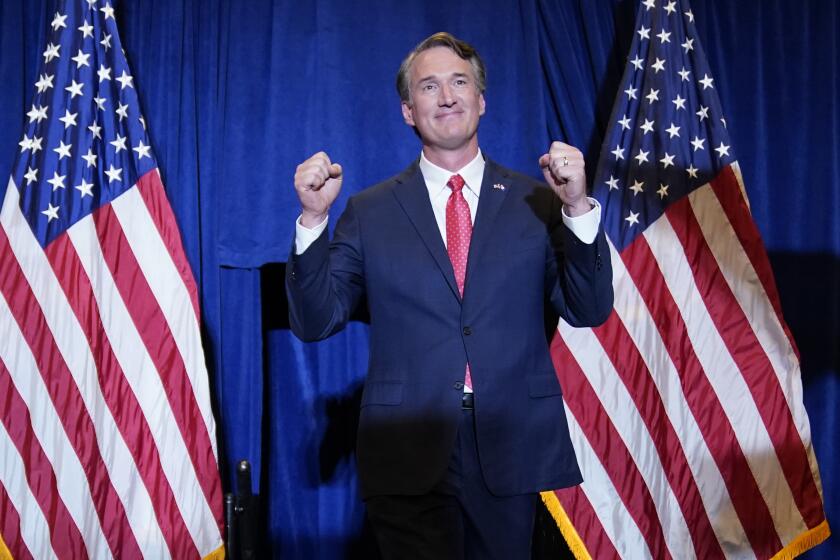Mueller calls back at least one participant in key meeting with Russians at Trump Tower

Reporting from Washington — Special counsel Robert S. Mueller III has recalled for questioning at least one participant in a controversial meeting with a Kremlin-connected Russian lawyer at Trump Tower in June 2016, and is looking into President Trump’s misleading claim that the discussion focused on adoption, rather than an offer to provide damaging information about Hillary Clinton.
Some defense lawyers involved in the case view Mueller’s latest push as a sign that investigators are focusing on possible obstruction of justice by Trump and several of his closest advisors for their statements about the politically sensitive meeting, rather than for collusion with the Russians.
Investigators also are exploring the involvement of the president’s daughter, Ivanka Trump, who did not attend the half-hour sit-down on June 9, 2016, but briefly spoke with two of the participants, a Russian lawyer and a Russian-born Washington lobbyist. Details of the encounter were not previously known.
It occurred at the Trump Tower elevator as the Russian lawyer, Natalia Veselnitskaya, and the lobbyist, Rinat Akhmetshin, were leaving the building and consisted of pleasantries, a person familiar with the episode said. But Mueller’s investigators want to know every contact the two visitors had with Trump’s family members and inner circle.
Mueller long has sought to nail down details of the unusual gathering at the height of the presidential race between three of Trump’s top campaign aides — his eldest son, Donald Trump Jr., his son-in-law, Jared Kushner, and his campaign manager, Paul Manafort — and Veselnitskaya, Akhmetshin, plus a Russian language translator, a U.S.-based employee of a Russian real estate group, and a British music promoter with Russian business ties who helped bring the group together.
After the New York Times first reported the meeting last July, 13 months after it had occurred, the White House issued a misleading statement while Trump flew back to Washington from the Group of 20 summit in Hamburg, Germany. It said that Trump Jr. had said he and the Russian lawyer had “primarily discussed a program about the adoption of Russian children,” and was unrelated to the campaign.
Mueller’s team is trying to determine if Trump and others involved in drafting the language aboard Air Force One knew it was inaccurate and whether it was aimed at deceiving federal investigators looking into whether the Trump campaign actively assisted a Russian intelligence operation aimed at interfering in the U.S. campaign.
In August, Trump Jr. released a chain of emails that showed he had agreed to the meeting not to talk about adoptions, but because the music promoter, Rob Goldstone, had assured him that the Russian lawyer had “official documents and information” that would “incriminate” Clinton, “and be very useful to your father.”
Goldstone wrote that the damaging information on Clinton was “part of Russia and its government’s support for Mr. Trump.”
“If it’s what you say, I love it,” Trump Jr. replied.
The meeting between Trump’s top campaign aides and the Russians hit the headlines again this week after Stephen K. Bannon, Trump’s former chief strategist, was quoted describing Trump Jr., Kushner and Manafort in scathing terms in a controversial new book.
“Even if you thought that this [meeting] was not treasonous, or unpatriotic, or bad ..., and I happen to think it’s all of that, you should have called the FBI immediately,” Bannon said, according to “Fire and Fury,” which was released Friday.
Bannon speculated that Trump Jr. brought the Russian group upstairs to meet the candidate, a claim that the participants have all denied.
“The chance that Don Jr. did not walk these jumos up to his father’s office on the twenty-sixth floor is zero,” Bannon is quoted as telling the author, Michael Wolff, using a Spanish-language slang meaning drunkards.
The book also says that Mark Corallo, then-spokesman for the president’s private legal team, quit because he believed the drafting of Trump’s statement may have obstructed justice.
“The persistent Trump idea that it is not a crime to lie to the media was regarded by the legal team as at best reckless and, in itself, potentially actionable: an explicit attempt to throw sand into the investigation’s gears,” Wolff wrote.
“Later that week, Corallo, seeing no good outcome — and privately confiding that that he believed the meeting on Air Force One represented a likely obstruction of justice — quit.”
Corallo, who was the Justice Department spokesman from 2002 to 2005 and now runs a public relations firm, did not respond to requests for comment Friday.
In closed-door testimony before the House Intelligence Committee last month,Trump Jr. denied that he had communicated directly with his father about the White House statement on adoptions, CNN reported.
The network said Trump Jr. told the committee he had instead coordinated the statement with Hope Hicks, the White House communications director, who was on Air Force One when it was drafted, quoting multiple people familiar with his testimony.
Participants in the meeting have said that the Russian lawyer did not bring any incriminating information on Clinton, and that she shifted the conversation to a discussion of the Magnitsky Act, a 2012 U.S. law bitterly criticized by the Kremlin that freezes assets of Russian officials responsible for human rights abuses.
Moscow responded to the law by prohibiting U.S. adoptions in Russia, which led to the reference to adoption in Trump Jr.’s initial statement about the meeting.
The Times is not identifying the individual Mueller has asked to return for further questioning as part of an agreement to keep the identity confidential.
Mueller’s investigation into possible obstruction of justice by Trump is also examining whether he improperly tried to shield his former national security advisor, Michael Flynn, from an FBI investigation and then fired FBI Director James B. Comey to block the inquiry.
John Dowd, one of Trump’s lawyers, declined to comment Friday on the direction of Mueller’s inquiry. Trump has repeatedly denied wrongdoing and in a tweet Friday again denounced allegations of collusion with Russia as “a total hoax.”
Mueller has charged four former Trump aides with crimes so far, although none of the charges have specifically included conspiracy to assist the Russian interference.
Manafort and his former deputy, Richard W.Gates III, have pleaded not guilty to a dozen charges of fraud, conspiracy and money laundering connected to their lobbying work in Ukraine. Flynn and George Papadopoulos, a former foreign policy advisor, both pleaded guilty to lying to the FBI and are cooperating with prosecutors.
The New York Times reported Thursday that Trump instructed White House lawyers last March to stop U.S. Atty. Gen. Jeff Sessions from stepping aside from the Justice Department investigation of Russian meddling, instructions that Sessions disregarded.
Trump’s attorneys have argued that, as president, he cannot be charged with obstructing justice because of his legal authority to hire and fire anyone in the executive branch, which includes the Justice Department.
He “cannot obstruct justice because he is the chief law enforcement officer under [Article II of the Constitution] and has every right to express his view of any case,” Dowd told Axios, a news website, last month. Article II details the president’s authority over the executive branch.
Twitter: @davidcloudLAT
More to Read
Get the L.A. Times Politics newsletter
Deeply reported insights into legislation, politics and policy from Sacramento, Washington and beyond. In your inbox three times per week.
You may occasionally receive promotional content from the Los Angeles Times.











